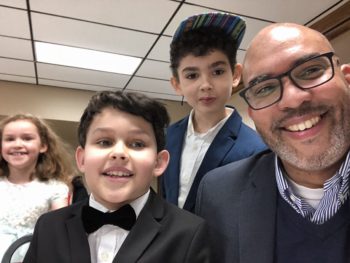Black fatherhood is often stereotyped as absent or deadbeat. In reality over have of black dads, live with their children. In fact, a 2013 CDC study found that of all fathers, Black dads are the most involved fathers on average. Chris Stewart is the CEO of Brightbeam, a network of education justice advocates and co-host of the “8 Black Hands” podcast. He is a Black Father of four who wants to dismantle the idea that present black fathers do not exist. He believes black father’s deserve recognition, love and support because they are often left out of the fatherhood conversation. He also believes there are plenty of good black men who are present in the lives of their children who should be seen as the norm instead of the exception.

Chicago Defender: What is the “myth of the Invisible Black Father”?
Chris Stewart: I think the myth is that we are not involved in the lives of black children, and that black children are walking around with this mass epidemic of fatherlessness. They take the out of wedlock birth rates of black women, and they equate that with missing black men.
I want people to start seeing black fathers. Start seeing the black men that are working jobs that they hate for kids that they love. Start seeing the black men that are doing their thing. may not be perfect, but you know what? We are giving white men all the roses in the world even when they do a raggedy job, but black fathers cannot do anything right if we believe what is shown in mass media. That is what I mean by invisible. We are not seen.
My social media feeds are blowing up with black men across the country. In so many of the father groups I’m in, men are sharing their heart and joy stories about their baby that made kindergarten for the first year, the baby that is graduating high school, that baby that got through college, and other incredible milestones.
There is a campaign to make black men always look lazy, shiftless, and irresponsible. I am not here to tell you that some of us will not live up to that. There are some who fall short. What I am going to say is we put all the noble characteristics on white men, even when they are falling down on the job and we will place all the negative characteristics on the black males.
Chicago Defender: Lately you have seen more positive celebrations of fatherhood such as the #GirlDad hashtag. Do you think that we are heading in the right direction, where we are trying to let go of these stereotypes? Are you seeing a shift?
Chris Stewart: I am not seeing the fast shift that we need and I am not seeing justice being done to our stories. I still think that we are invisible. In some ways, even more, especially after this last president. I feel there is a resurgence of the 1950s conservative stereotype of black folks. The reason for that is rooted in systemic racism. There’s a political reason to wield that battle and narrative with us because there’s a political material outcome that they want from that, which is to discount all of our activism around these systems, banking systems, court systems, law systems, school systems, all in which there is determined to be empirical evidence of discrimination, racism in those systems.

Chicago Defender: What message would you give to fellow dads as we celebrate Father’s Day?
Chris Stewart: I would tell fathers to see each other and start lifting each other up in successes and victories. Support one another because we cannot expect others to do it. I would tell dads to raise your voices and stop allowing yourselves to be minimized.
I want people to do is to start seeing black men and black fathers. Lift us up instead of always thinking the worst of us. Lastly, if we are a society that values the importance of black fathers, what are we going to do support policies that produce healthy black men, employed black men and voting black men? There are decades of policies that are separating black men from the vote, from their jobs, from income sources, and putting us into situations where the book is thrown at us. You cannot have it both ways. You cannot say how important we are to the community and our children but push policies that hurt and harm us.
Danielle Sanders is a journalist and writer living in Chicago. Find her on Twitter @DanieSanders20.



